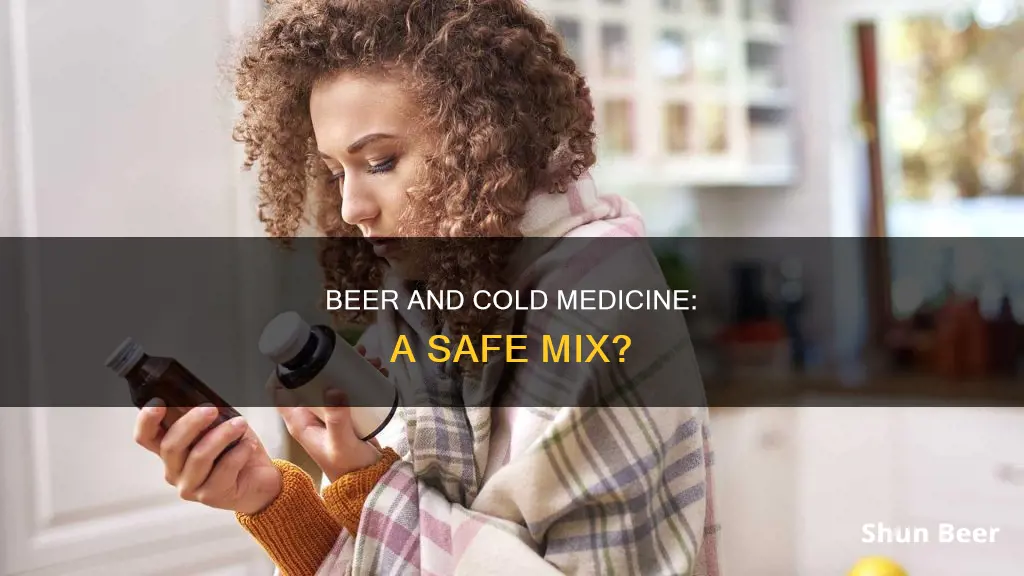
Drinking alcohol while taking cold medicine is generally not recommended due to the potential health risks involved. Alcohol can negatively impact your immune system, making it harder for your body to fight off infections and prolonging the recovery process. Additionally, alcohol can worsen common cold symptoms such as headaches, body aches, nausea, and fatigue, and can cause dehydration, which can further aggravate congestion.
Mixing alcohol with certain cold medications can lead to dangerous interactions and increase the risk of adverse effects and overdose. For example, combining alcohol with pain relievers commonly found in cold medications, such as acetaminophen, can cause severe liver damage. Antihistamines, when mixed with alcohol, can lead to excessive drowsiness and increase the risk of accidents. Cough suppressants containing dextromethorphan, a central nervous system depressant, can also have dangerous interactions with alcohol, increasing the risk of respiratory depression and other serious side effects.
It is important to carefully read the labels of any cold medications you are taking and be aware of any alcohol warnings. Consulting with a healthcare professional or pharmacist is always recommended to ensure your safety and well-being.
| Characteristics | Values |
|---|---|
| Is it okay to drink beer when taking cold medicine? | No |
| Why? | Mixing alcohol and cold medicine can expose you to several adverse health risks and may increase the chance of overdose. |
| Alcohol can decrease the likelihood that you will experience symptomatic relief from your cold medicine while at the same time increasing your likelihood of adverse effects and overdose. | |
| Alcohol can impair the immune system, making it harder to recover from an illness. | |
| Alcohol can have dangerous interactions with over-the-counter cold and flu medications. | |
| Alcohol can increase side effects and the risk of liver damage or other serious health issues. | |
| Alcohol can worsen symptoms such as nausea, vomiting, and headaches. |
What You'll Learn
- Beer and cold medicine can cause dehydration, worsening symptoms like congestion
- Drinking beer with cold medicine can impair your immune system, making it harder to fight infection
- Beer and cold medicine can disrupt sleep, which is important for recovery
- Beer and cold medicine can increase the risk of overdose
- Beer and cold medicine can cause dangerous interactions, including liver damage

Beer and cold medicine can cause dehydration, worsening symptoms like congestion
Drinking beer while taking cold medicine is not recommended, as it can lead to several adverse health effects. One of the main concerns is dehydration, which can worsen symptoms like congestion.
When you're sick, your body is already working hard to fight off the infection. Alcohol consumption can weaken your immune system, making it even harder for your body to recover. Additionally, alcohol can disrupt your sleep, which is crucial for the recovery process. The combination of these two factors may prolong your illness.
Beer, like any other alcoholic beverage, can cause dehydration. When you're sick, staying hydrated is essential to help thin out mucus and soothe congestion. However, alcohol has a diuretic effect, causing your body to expel fluid more rapidly through increased urination. This can lead to dehydration, making your congestion worse.
Furthermore, mixing beer with cold medication can intensify the sedating effects of the medication, making it unsafe to perform certain tasks such as driving. It can also increase the risk of falls and serious injuries, especially in the elderly. The combination may also lead to an increased risk of overdose.
It's important to note that the specific cold medication you're taking can also play a role in the potential side effects when mixed with alcohol. For example, combining alcohol with certain pain relievers commonly found in cold medications, such as acetaminophen, can cause severe liver damage. Antihistamines, cough suppressants, and decongestants can also have severe side effects when mixed with alcohol, including increased dizziness, drowsiness, impaired coordination, and difficulty concentrating.
In conclusion, it's best to avoid drinking beer or any other alcoholic beverage when taking cold medication. The combination can lead to dehydration, which can worsen congestion and prolong your recovery. It can also intensify the side effects of the medication and increase the risk of adverse health consequences. Until you're feeling better, it's advisable to stick to hydrating beverages and give your body the rest it needs to recover.
Exploring Beer Culture in Scotland: A Deep Dive
You may want to see also

Drinking beer with cold medicine can impair your immune system, making it harder to fight infection
Drinking alcohol when you're sick is generally not recommended, and it's especially important to avoid drinking beer when taking cold medicine. Alcohol can impair your immune system, making it harder to fight off infection and prolonging your recovery time.
When you're sick, your body is already working hard to fight off the infection. Alcohol can interfere with this process by weakening your immune system. This means that your body may have a harder time fighting off the illness, and it could take longer for you to recover.
In addition, drinking beer while taking cold medicine can increase your risk of experiencing adverse side effects. Cold medicines often contain ingredients such as acetaminophen, dextromethorphan, and antihistamines, which can interact with alcohol. These interactions can lead to increased dizziness, drowsiness, impaired coordination, difficulty concentrating, and even respiratory depression.
The combination of beer and cold medicine can also worsen symptoms such as nausea, vomiting, and headaches. Alcohol is a diuretic, which means it can contribute to dehydration. This can be especially problematic when you're sick, as staying hydrated is crucial for your body's recovery.
Furthermore, women and elderly individuals may be at a greater risk of experiencing adverse medication interactions when mixing alcohol with cold medicine. Women tend to have a higher proportion of alcohol in their bloodstream compared to men who drink the same amount, which can increase the risk of medication interactions. Elderly individuals may also be more susceptible to adverse interactions due to the slower processing of alcohol in their bodies and the potential for multiple medication use.
It's important to note that the effects of mixing beer and cold medicine can vary depending on the specific medication and the amount of alcohol consumed. However, in general, it's advisable to avoid drinking beer or any other form of alcohol when taking cold medicine to give your body the best chance of fighting off the infection and recovering quickly.
Women and Beer: How Much is Too Much?
You may want to see also

Beer and cold medicine can disrupt sleep, which is important for recovery
Drinking beer when taking cold medicine is not recommended, as it can have adverse effects on your health and recovery. Beer and cold medicine can both disrupt your sleep, which is essential for fighting illness and recovering.
A good night's rest is crucial for your body to heal and recover from sickness. However, consuming alcohol, such as beer, can interfere with your sleep. Alcohol disrupts REM sleep, the most restorative type of sleep, leaving you feeling groggy and tired the next day. It also activates a sleep pattern called alpha activity, which prevents your body from entering the deep sleep it needs for recovery.
Additionally, cold medications often contain antihistamines, which can cause drowsiness. When combined with alcohol, the sedating effects can be intensified, making it unsafe to perform certain tasks such as driving. This combination may also increase the risk of falls and serious injuries, especially in elderly individuals.
To promote a restful night's sleep and support your recovery, it is advisable to avoid drinking beer while taking cold medicine. Instead, focus on getting enough rest, staying hydrated, and giving your body the time it needs to heal.
It is important to carefully read the labels of your cold medications and be aware of any ingredients that may interact with alcohol. Consulting with a healthcare professional or pharmacist is always recommended to ensure your safety and well-being.
Exploring Salt Springs Recreation Area with a Beer
You may want to see also

Beer and cold medicine can increase the risk of overdose
Drinking beer when taking cold medicine is not recommended, as it can increase the risk of overdose and lead to several adverse health effects. Beer, being an alcoholic beverage, can interact with the ingredients in cold medicine, such as antihistamines, pain relievers, and cough suppressants, and intensify their effects.
Antihistamines, commonly found in cold medicines, can cause excessive drowsiness and increase the risk of accidents, even without alcohol. When combined with beer or other alcoholic drinks, the risk of overdose and serious injuries, especially in the elderly, increases. This is because alcohol can enhance the sedating effects of antihistamines, impairing an individual's ability to perform tasks such as driving.
Pain relievers, such as acetaminophen, found in many cold and flu medications, can also interact with alcohol. Both substances are metabolized in the liver, and mixing them can lead to severe liver damage or even death. Additionally, alcohol can worsen symptoms like nausea, vomiting, and headaches, which are common in both cold and flu illnesses and the side effects of alcohol consumption.
Cough suppressants, such as dextromethorphan, are central nervous system depressants, similar to alcohol. Combining cough syrup with beer or other alcoholic drinks can increase the risk of side effects like dizziness, drowsiness, impaired coordination, and difficulty concentrating. It can also lead to respiratory depression, slowed or stopped breathing, and in some cases, permanent psychosis.
The combination of beer and cold medicine can also negatively impact the body's immune system, making it harder to recover from an illness. Alcohol impairs the immune system, and when combined with cold medicine, can prolong the recovery process and increase the severity of symptoms. Therefore, it is generally advised to avoid drinking beer or any alcoholic beverage when taking cold medicine to prevent adverse health effects and reduce the risk of overdose.
Beer Consumption Guidelines for Diabetics: How Often is Safe?
You may want to see also

Beer and cold medicine can cause dangerous interactions, including liver damage
Drinking beer while taking cold medicine is not advisable, as it can lead to dangerous interactions and severe side effects, including liver damage. Mixing alcohol with cold medication can intensify the sedating effects of the medicine, making it unsafe to perform certain tasks such as driving. It can also increase the risk of falls and injuries, especially in the elderly.
The combination of beer and cold medicine may also increase the risk of overdose and cause adverse health effects, including bleeding, ulcers, upset stomach, rapid heartbeat, and liver damage. This is because both beer and some cold medications are metabolized by the liver, and consuming them together can overload the organ, leading to potential damage.
Additionally, women and elderly individuals are at a greater risk of experiencing adverse medication interactions when mixing alcohol with cold medicine. Women tend to have a higher proportion of alcohol in their bloodstream compared to men, increasing the risk of medication interactions. Elderly individuals take longer to process alcohol, and they are also more likely to be taking multiple medications, increasing the chances of harmful interactions.
Furthermore, alcohol can impair the immune system, making it harder for the body to fight off infections and prolonging the recovery process. It can also worsen symptoms such as nausea, vomiting, headaches, and congestion due to dehydration. Therefore, it is generally recommended to avoid drinking beer or any other alcoholic beverage when taking cold medicine to prevent dangerous interactions and adverse health effects, including liver damage.
Beer and Insulin: Is It Safe to Drink?
You may want to see also
Frequently asked questions
No, it is not okay to drink beer when taking cold medicine. Alcohol can have dangerous interactions with over-the-counter cold and flu medications.
Combining alcohol with cold medicine can expose you to adverse health risks and may increase the chance of overdose. Alcohol can also intensify the sedating effects of cold medicine, making it unsafe to perform certain tasks such as driving.
Possible side effects include increased dizziness, drowsiness, impaired coordination, difficulty concentrating, and liver damage.
It is recommended that you wait until the cold medicine has left your body, which is typically about 24 to 48 hours after your last dose.
Yes, it is recommended to opt for hydrating beverages instead, as alcohol can exacerbate dehydration and worsen symptoms such as nausea, vomiting, and headaches.







